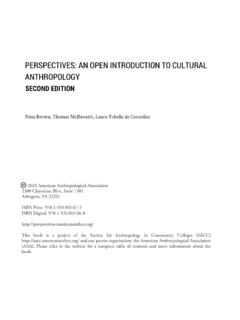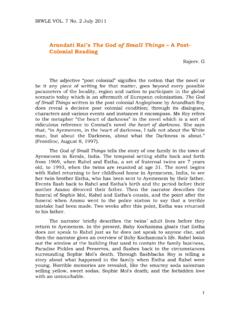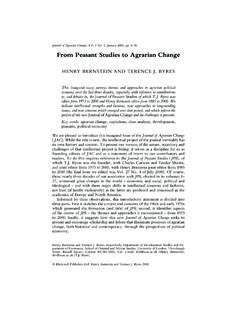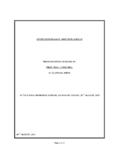Transcription of The Prize: The Epic Quest For Oil Money and Power by ...
1 The prize : The Epic Quest For Oil Money and Power by Daniel Yergin Andrew Berry PO Box 918 Vineyard Haven, MA 02568 In one of the first classes of the school year, I like to take my US history classes outside to sit on the curb facing the parking lot. Before we go outside I tell them only that they are about to engage in an observation exercise. I have them bring a clipboard, a pencil, and some paper. From their seated position they can see about one hundred cars, most driven by students at the school. As they face the parked cars, I tell them simply that they are looking at a great deal of the history that shapes their lives today.
2 The response is mostly inertia. They look perplexed. I ask them write three observations about what they see in the parking lot. Finally, following a discussion of what they observe and how it might be related to the study of history, I ask them to come up with three historical questions about what they see that they would like answered this year. To prod them a bit I ask: How many of you are looking forward to getting your license and driving to school? All hands go up. Why is that an expectation for you? Where did that expectation come from? After a few minutes of discussion, many are ready to ask their questions.
3 Overall, though, it is a difficult exercise, understandably, for a ninth grader. In the end students help students with the observations and questions, and we delve into some stuff about which they have some awareness: industrialization, Henry Ford, gas prices, the Middle East, terrorism. Eventually, they even realize that the pavement, the lighting of the lot, the concrete they are sitting on, and the clothes they are wearing are fossil fuel driven. Even with those understandings, what they generally don t get and what I would like to add to the US history enduring understandings (Understanding By Design) is the notion that modern humans, perhaps Americans more than others, are essentially hydrocarbon dependent.
4 We are, in the parlance of Daniel Yergin, living in the age of Hydrocarbon Man. I would like them to understand how that happened, that we are probably at the tail end of that historic energy era in the same way that other energy eras came and went, and I want them to think about what their roles will be in the emerging energy era. I believe that understanding this history is essential for the next generation, and The prize provided a thorough treatment of the creation of the Hydrocarbon Age. Daniel Yergin s book is a treasure trove of interesting information that can capture the interest of young people.
5 Some of it reads more like fiction (You can t make this stuff up!), especially the stories of the people exploring for oil in the late 1800 s: George Bissell and the use of oil as medicine; Colonel Edwin Drake in Titusville and the Shoe and Leather Petroleum Company; John Galey who claimed he could smell oil in the ground; Dad Joiner and Doc Lloyd and their unlikely discovery of the East Texas oil field. Then there were the ruthless industrialists: the Rothschilds and Nobels developing Russia s oil resource until the Bolshevik Revolution, Henri Deterding of Royal Dutch Shell and the relentless development of Pacific resources, and our own Rockefeller of Standard Oil among others.
6 As a biographical exercise, it would be interesting to have students engage in research of the interesting characters in the exploration and early development of various uses of oil. Probably most students are unaware, for instance, that natural gas and gasoline were unused and wasted by-products of early refining for kerosene, the product that replaced paraffin and even whale oil for lighting. Coupling the decline of the local whaling industry with the rise of refining for kerosene would be an interesting connection for Martha s Vineyard kids. Yergin s thesis is that virtually all of human history in the last 150 years is fundamentally about oil.
7 To say that his research is comprehensive would be an understatement. Beginning with the early discovery of oil in Pennsylvania and Rockefeller s actions to bring order out of chaos in kerosene production, marketing and distribution ( our plan ), Yergin takes the reader through historical eras and demonstrates how oil is at the heart of practically all human activity. The critical turning point confirming the future importance of oil was WWI, which was the first mechanized war dependent on fuel. The armada of taxis that brought French reinforcements to the front lines at a critical time was a somewhat humorous but significant observation about the strategic importance of fuel to successful armed conflict.
8 The introduction of tanks, trucks, and aircraft demonstrated that all future wars would be oil dependent. Shortly, the British argued the merits of changing from home mined coal to Middle East oil for their navy, a decision that improved the tactical capability of their fleet but brought future dependence and security issues. Oil had such advantages that the dependence was a security risk worth assuming. WWII provided ample evidence of how oil was driving nations. The Japanese launched the attack on Pearl Harbor to protect oil shipping lanes from Indonesia. Ironically, their conscious failure to destroy the US oil supply depot on that raid turned out to be a serious strategic error.
9 Without the fuel, the US navy would have been much slower to rebound and challenge Japan s grip on Indonesian supplies. Hitler also was obsessed with gaining access to the oil fields at Baku, and his failure to do so spelled disaster at Stalingrad. Rommel was defeated in North Africa as much by a lack of fuel as he was by Montgomery. Patton s lack of fuel, at least from his egoistical point of view, was the reason the Russians got more of Eastern Europe than they might have otherwise. Yergin sees the end of WWII as the critical turning point in the history of oil for the West. Colonial empires had dissolved which in turn meant Britain and France, for instance, were more and more dependent on forces it could control less and less.
10 Though the US supplied about 63% of total world oil production prior to WWII, allied reliance on US oil greatly depleted reserves, and shortly after the War, with US consumer demand skyrocketing, the US became a net importer. Since the US represented the largest consuming Power in the world at that time, the start of dependence on outside resources was a major shift. Yergin sees three deals at the end of WWII determining the course of oil issues thereafter mostly because the US was acting to protect its rapidly expanding appetite for oil. The first was the announcement of the Truman Doctrine on March 12, 1947.





